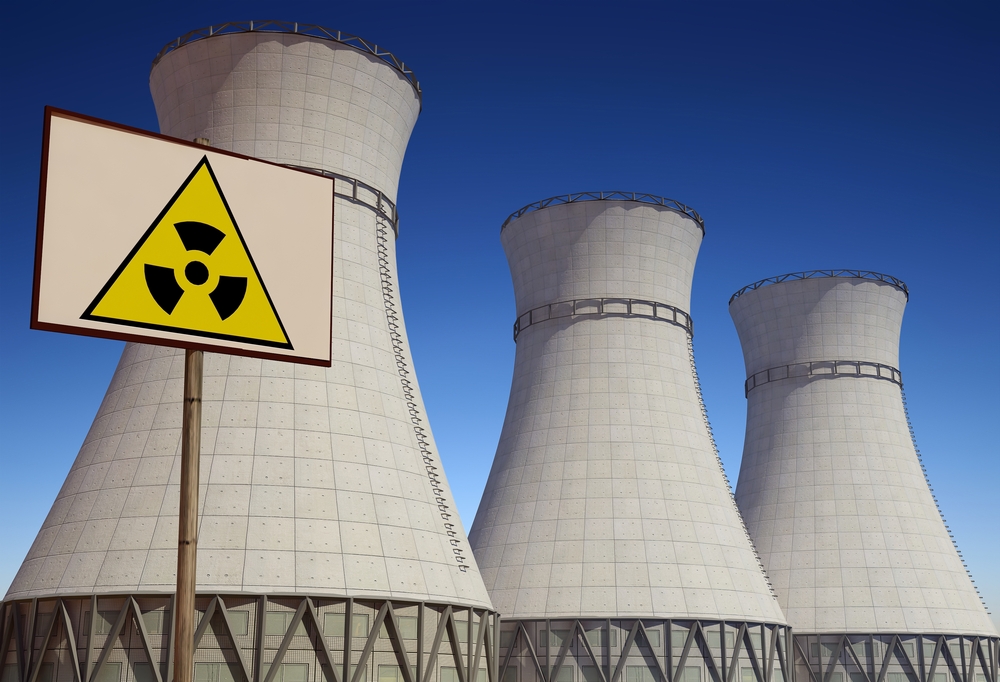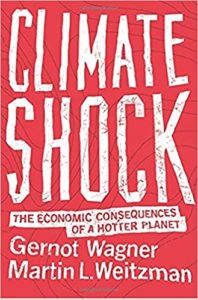

In his well-deserved victory lap about his bet with Daniel Reeves, co-blogger Bryan Caplan points out that one major flaw in Gernot Wagner’s and Martin L. Weitzman’s book Climate Shock is its treatment or, rather, non-treatment of nuclear power.
Bryan writes:
Wagner and Weitzman barely mention nuclear power or the absurd regulatory burden under which it labors. This fits with the Social Desirability Bias story, and makes me further distrust them.
In a comment on Bryan’s post, bettor Daniel Reeves responds:
I may be more trusting than you but I’d only have distrusted them on those grounds if they’d argued against nuclear energy. Wagner and Weitzman think policy intervention should be limited to carbon taxes. Nuclear energy doesn’t emit carbon so they are implicitly pro-nuclear. I’m sure they’d agree about the absurd regulatory burden as well. They do spend a lot of time in the book on the absurdity of the current fossil fuel subsidies, which I’m sure you also despise.
I think Dan is way more trusting than Bryan and way more trusting that is justified. I reviewed the book for Regulation in 2015-16 and read every page and every footnote. Reeves is right that the authors don’t argue against nuclear energy. But they have an asymmetric treatment of alternative non-carbon energies. On pages 17 and 18, they praise solar energy. On page 34 they advocate subsidizing innovation in solar panels. On page 144, they write: “Wind, solar, and all sorts of low-carbon technologies win.”
What goes unmentioned? The N-word: Nuclear.
If authors consider alternatives to carbon-based fuels and mention some explicitly, it’s reasonable to conclude that they don’t favor the ones they don’t mention at all.
You will find “nuclear” in the index, though. Here’s what you’ll find:
nuclear weapons, 94, 156, 194. See also terrorism.

READER COMMENTS
Art K
Nov 9 2021 at 7:30pm
Nuclear is great if you already have it. It simply take too long to build. In the 10 years and cost overruns it takes to build nuclear, you could have quite an overbuilt solar/wind +battery solution.
I do prefer a strong baseload solution like nuclear. Too bad geothermal isn’t on the map.
Peter Scott
Nov 10 2021 at 1:07pm
You may be pleasantly surprised to hear that most nuclear plant construction these days goes smoothly and takes about 5-7 years from start to finish, with a lot of concurrent construction possible. That’s because most construction is happening in countries like China, India, and South Korea which have put in the time and money to get good at building nuclear plants. They have experienced workers who aren’t figuring things out as they go, they have manufacturing capacity for the components in place, and they have regulatory regimes that are possible to work with. We know this can be done because it is being done. The problem is making it happen in other countries.
If it were easier to get regulatory approval for them, I’d say that (very) small modular reactors are the way to go for out-of-practice countries: a lot of the physically hard parts of building huge nuclear plants come from the simple fact that they’re huge, and if you make the reactors small enough you’ll naturally end up making a lot of them with relatively little time spent on each, so you can iterate on your assembly line setup the same way automobile companies do.
Charles Hooper
Nov 9 2021 at 7:49pm
Nuclear power produces virtually zero carbon emissions. I don’t know anyone who disputes that fact. If those who think the world will suffer serious consequences as a result of carbon emissions don’t endorse nuclear power, then the burden of proof falls on their shoulders. Why don’t they like it? And if they don’t give very good reasons, then we can assume that they don’t really believe the pessimistic predictions they peddle. And if they themselves don’t believe what they’ve spent considerable energy promoting, then no one should believe anything they say.
The three arguments I’ve heard are: nuclear power is dangerous; nuclear power is expensive per kilowatt hour; and nuclear power isn’t as good as other forms of power generation.
In truth, nuclear power is less dangerous than other forms of power generation. Nuclear power has huge advantages over solar and wind that aren’t reliable. Nuclear power is somewhat more expensive largely, or at least partly, because of regulations. Regulations can be changed. Newer reactor designs promise cheaper and safer power.
But none of these arguments is enough to discount nuclear power if you think the Earth is at serious risk.
If you throw a lifesaver to a person drowning and they reject your lifesaver because it’s the wrong color or it’s imported from China, that person isn’t really drowning; they are faking.
zeke5123
Nov 10 2021 at 1:56pm
Some of the salt based nuclear reactors are really interesting as they appear meltdown proof.
One cost of nuclear is what to do with the waste. In the US, waste is often stored on site. This is not pragmatic for a number of reasons. Something like Yucca Mt makes more sense, since waste storage (and security) can be scaled. Not sure how much cost that reduces per kilowatt (guessing it isn’t huge, but not nothing either). It also perhaps makes a one stop shop to refine the spent uranium (if and when nuclear becomes more expensive).
I also don’t really take K/price seriously when it comes to solar or wind. Yes, when the sun is shinning and the wind is blowing it is pretty cheap. But the problem is that sun isn’t always shinning and the wind isn’t always blowing. You are left with either rolling blackouts or really costly stand-by power plants.
robc
Nov 11 2021 at 10:15am
Reprocessing waste to get the usable fuel out reduces the amount of waste material dramatically, but was stopped during the Carter administration.
Thomas Lee Hutcheson
Nov 10 2021 at 5:53am
Anyone who wants to reduce and the harm from increasing concentration of CO2 in the atmosphere ought to want every energy generating technology available for investment. Unscrambling the mis-regulation of nuclear power is an important objective, but probably not possible before others (including maybe even geothermal) will get there first.
Tax net emissions and may the best technology win.
Alan Goldhammer
Nov 10 2021 at 7:53am
England are in the process of building some small modular nuclear reactors that can provide electricity to 1 million homes. The footprint of the facility is about the size of two soccer fields. France gets 2/3 of its electricity from nuclear and the also excel at reprocessing spent fuel rods, something the US had problems with some years ago which is why they continue to focus on long term storage of spent fuel which nobody wants in their region. France has just announced a new program to increase the number of reactors in response to the recent climate meetings. I believe that the government rather than the private sector manages their nuclear energy program.
the major problem with nuclear is the high dread that is associated with nuclear accidents. Paul Slovik did some ground breaking research in this area over 30 years ago, looking at peoples perceptions of a variety of technologies. It was interesting that genetic engineering held the same dread at that time.
I’m a big proponent of nuclear power but don’t see the current situation changing much in this country as the psychological dread factor is difficult to overcome (one might argue the same thing about Covid vaccines where a significant portion of the public does not trust them) and it is very difficult to establish what the appropriate regulatory framework might be. Associated with that is government is forced to insure plants as the private sector refuses to do so. High profile bankruptcies of some nuclear plant providers has not helped.
robc
Nov 11 2021 at 10:17am
The US doesn’t have a problem with reprocessing…the Carter administration outlawed it.
It would work just fine in the US.
nobody.really
Nov 10 2021 at 5:39pm
In December 2016, the Japanese government estimated decontamination, compensation, decommissioning, and radioactive waste storage costs for the Fukashima nuclear disaster at 21.5 trillion yen. Who knows what the figure would be today.
Yeah, maybe repealing regulations would let us build fission reactors quicker. And once you did so, what would happen when, tomorrow or the next day, someone invents better energy storage technology? Or demand-response aggregators get better at paying people to adjust their loads to meet spot-market generating costs, reducing demand? (Demand for electricity in the US has been basically flat for the past 10 years, so if a voice is telling you “If you build it, they will come!,” see a shrink.) Or some new generation technology (nuclear fusion?) comes along?
I don’t mean to begrudge anyone the option of investing in fission generation if they want to. But looking at the market–current and anticipated–I don’t think that’s where I’d be sinking my billions. The meltdown I’m afraid of has nothing to do with physics.
robc
Nov 11 2021 at 10:26am
Since I mentioned it twice above, I should explain why the Carter administration made the decision to stop reprocessing fuel.
The fissile material in nuclear fuel is generally U-235. In reprocessed fuel it is mostly Pu-239 (The U-235 has been used up). Separating U-235 from U-238 is insanely hard, so if you were a rogue nation who stole a fuel shipment, separating it out to make bomb material is difficult. Pu-239 is relatively easy to separate from U-238, it can be done chemically.
So the decision to not reprocess was primarily done to prevent a rogue nation/terrorist group from getting their hands on material capable of being converted to weapons grade.
As far as I know, France hasn’t had an issue with this.
Comments are closed.